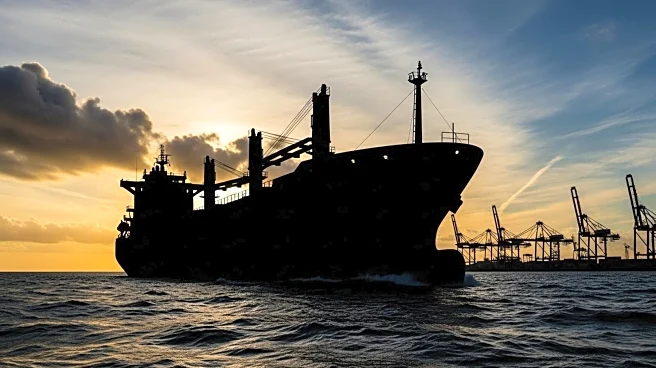What's Happening?
The U.S. government is set to implement port fees on Chinese-made freight vessels, causing confusion among ocean carriers about potential financial impacts. The fees, scheduled to begin next week, have led carriers to reconsider their vessel financing terms, fearing identification as Chinese and subsequent financial penalties. The fees are part of a broader U.S. strategy to counter China's dominance in global shipbuilding. Chinese lessors are increasingly involved in ship operations, offering various financing structures. The industry is uncertain about the duration of these fees, prompting shipowners to explore refinancing options to avoid potential costs.
Why It's Important?
The introduction of U.S. port fees on Chinese-built ships could significantly impact international shipping costs and logistics. Ocean carriers may face increased operational expenses, potentially affecting global trade routes and shipping costs. The fees reflect ongoing trade tensions between the U.S. and China, with potential repercussions for international trade agreements. Shipowners and carriers must navigate complex financing decisions, balancing cost and compliance with new regulations. The situation underscores the geopolitical influence on global shipping and trade, with potential shifts in market dynamics and financing structures.
What's Next?
As the U.S. port fees take effect, ocean carriers may continue to adjust their routes and financing strategies to mitigate costs. The industry awaits further guidance from the U.S. Trade Representative on fee implementation and potential amendments. Chinese retaliatory measures, including reciprocal port fees, could escalate trade tensions, affecting U.S.-China maritime relations. Shipowners may increasingly seek non-Chinese financing options, potentially altering global ship finance markets. The situation remains fluid, with potential for further regulatory changes and industry adaptations.
Beyond the Headlines
The U.S. port fees highlight broader geopolitical tensions and protectionist policies affecting global trade. The fees may prompt ethical and legal considerations regarding international trade practices and compliance. Long-term shifts in ship financing and ownership structures could emerge, influencing global shipping industry dynamics. The situation may also affect cultural perceptions of trade relations between the U.S. and China, with potential implications for diplomatic negotiations.










